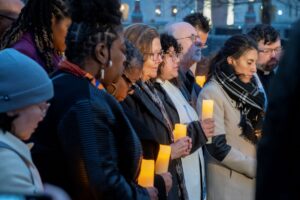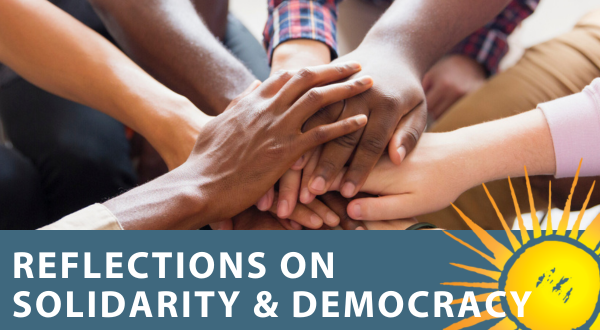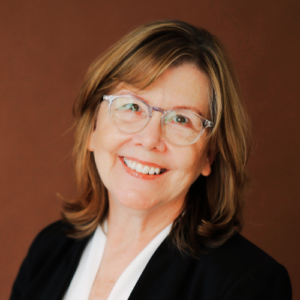
Participants in Transformation
Renewing Democracy is a Truly Sacred Process
Mary J. Novak
November 3, 2023
We are about a year away from the 2024 election, a critical moment for our country. We will either choose candidates who uphold and protect our democratic processes, or ones who degrade and subvert them.
Whether we realize it or not, we are constantly making choices about democracy. Every day, voting rights are put up for negotiation, Congressional maps are drawn and redrawn, our leaders are offered millions of dollars from corporate lobbies — and people like you and me engage in the work of advocacy for the common good. Democracy is a way of living that we must practice continually to keep common good goals in play.
While some see “politics” as a dirty word, Pope Francis teaches that we need politics. Specifically, we need politics centered on human dignity and the common good. For that centering to happen, our politics and policies must spring from below — being not just for those on the margins, but with and of the margins. The Catholic tradition teaches that when our politics are grounded in inclusive participation, love, and encounter with communities who are suffering, politics can become a sacred vocation — and, in Francis’ words, “one of the highest forms of charity.”
The importance of elections in transforming our politics cannot be overstated. But our politics also requires a kind of transformation that no single election can bring about. This is because a just democracy does not only mean free elections and functional governance. It also means a culture, politics, and society of participation.
Participation is one of the central principles of Catholic Social Teaching. The U.S. bishops, in their resources on Catholic Social Teaching, write, “We believe people have a right and a duty to participate in society, seeking together the common good and well-being of all, especially the poor and vulnerable.”
What could it mean to transform our politics, to create a system animated by participation, solidarity, and interdependence? What policies do we need?
For starters, we can ditch the heinous lie that only the “productive” or “prosperous” deserve what they need to get by (this is the false logic of Reagan-style capitalism). We can enact legislation that strengthens communities with access to health care, housing, jobs, and food. We can halt the ongoing legacy of disenfranchisement by strengthening the rights of Black and Brown communities. We can elect candidates who, in both word and deed, respect and bolster democratic processes. We can stop allowing corporations and lobbies representing the interests of the wealthy few to dominate our politics — especially when those interests involve grave harms like fracking and weapons proliferation.

Christian leaders gather across from the U.S. Capitol Building for a sunrise vigil marking the second anniversary of the January 6 insurrection. Photo courtesy of Baptist Joint Committee for Religious Liberty.
A participatory political system is not just one in which everyone gets a vote — although that is critical, and not even where our system is now. Rather, it is one in which communities are able to work together, in a spirit of liberation and mutual care, to solve problems and ensure that everyone has what they need to thrive. There is absolutely no room for any kind of oppression, stratification, or exploitation. A participatory political system is predicated on solidarity: the understanding that we are all interconnected, and that true flourishing is never at the expense or exclusion of another.
At the core, our political consciousness needs a renewed awareness of our interconnectedness. This is what Pope Francis has been calling for, especially in his encyclical Laudato Si’: “Everything is interconnected, and this invites us to develop a spirituality of that global solidarity which flows from the mystery of the Trinity.” It is this emphasis on interconnectedness, among and with both people and the rest of the natural world, that has prompted NETWORK to join in the crucial work of climate justice.
Ultimately, we are called to see that we are all intrinsically linked, which means your liberation is inseparable from mine. We are called to processes of inclusive, justice-driven, and collective decision-making. Many communities of women religious in the U.S. and around the world — communities I enjoy visiting and working with directly as part of my role at NETWORK — already model this vision of transformed politics, in the way they live into consensus-based, community discernment that follows the Spirit and is enlivened with care.
This season, we are moving through the annual dying back that is autumn, which will soon turn to the surprising hope breaking through at Christmas. In our politics, may we similarly move through a “dying back” of exclusion and domination, and emerge with hope and new possibilities for a society of participation, solidarity, and transformation.
Reclaiming the reality of our interconnectedness will unlock greater potential to transform our society. Instead of trickle-down, let transformation and renewal flow from living our sacred vocation of politics for the common good.
Mary J. Novak is NETWORK’s Executive Director.








